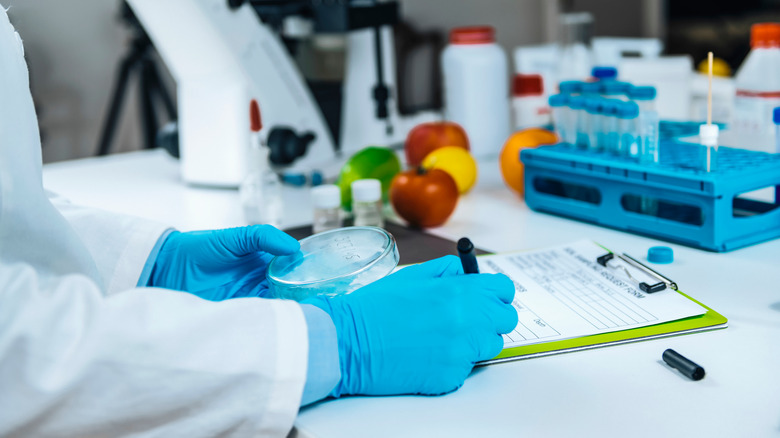The Major Flaw In Food Sensitivity Tests
If you don't have a food allergy yourself, it's likely you know someone who does. Around 6% of Americans are gluten intolerant (per Cleveland Clinic) and 1%, or one in 133 Americans have celiac disease (via Beyond Celiac). Cleveland Clinic describes celiac disease as an autoimmune disorder that causes the body to mistake gluten as a virus, whereas gluten intolerant people don't have an abnormal gene, though they can still feel tired or sick after consuming the protein.
Per Very Well Health, the most common food allergy is caused by dairy products. Those with lactose intolerance lack the enzyme lactase needed to consume milk, cheese, butter, and additional products from cows and other mammals. Many people are also unable to consume eggs due to certain proteins, and for some, peanuts can cause digestive and respiratory problems. It's also common for someone to not know what's causing their stomach pain — they just know they have issues that appear after eating. It seems easy to grab a food sensitivity test to figure out the issue, but it might just be a waste of time and money.
An allergist is the best way to go
Over-the-counter food sensitivity tests aren't as accurate as you may think. According to the New York Times, tests typically use either hair or blood samples. When hair is used, the test measures the amount of "bioresonance" present in order to calculate energy wavelengths in your body. When blood is used for testing, it must be conducted after consuming potential problem foods to note the changes in your blood cells. Unfortunately, neither of these methods has been proven to work. Though the results reveal a list of foods — everything from shellfish and peanuts to soy sauce and sesame, according to Healthline — there's a chance they aren't really accurate.
According to the American College of Allergy, Asthma, & Immunology, an appointment with an allergist is the best way to diagnose food-related sensitivities. The most accurate test is an oral food test, where patients are fed potential problem foods little by little while under supervision. Your doctor may also recommend an elimination diet to identify the foods causing problems. Whichever route your doctor suggests, it will be a far likelier way to get to the bottom of your issues and help you find relief faster than over-the-counter tests.

